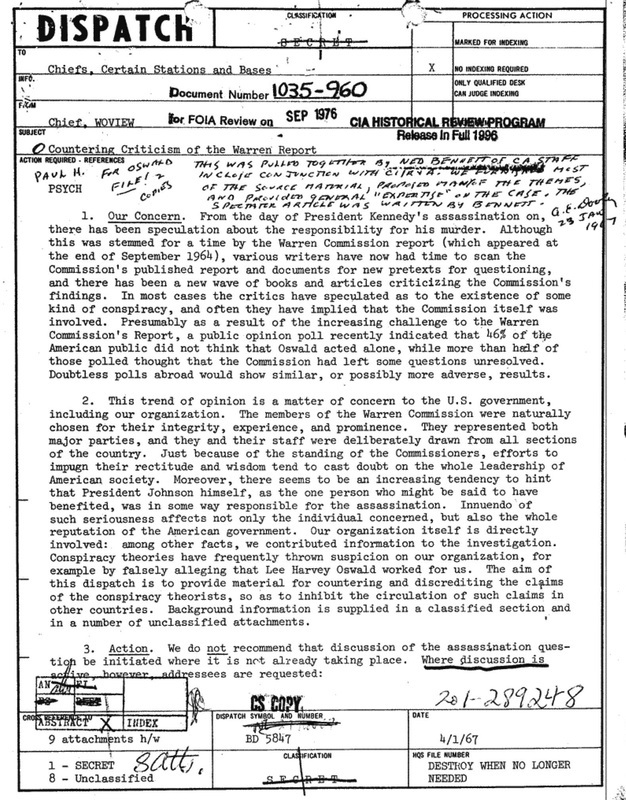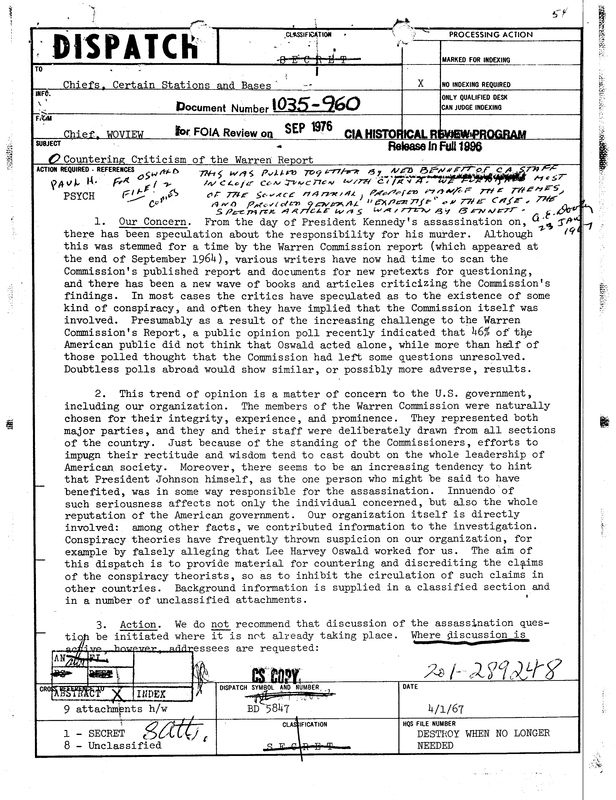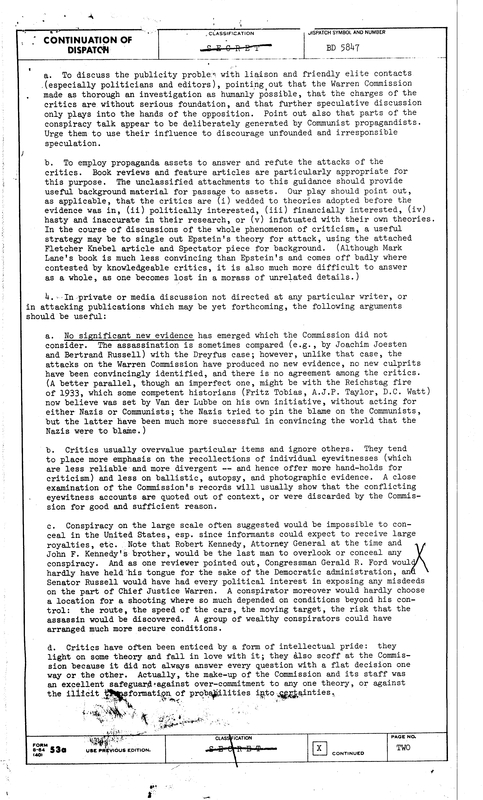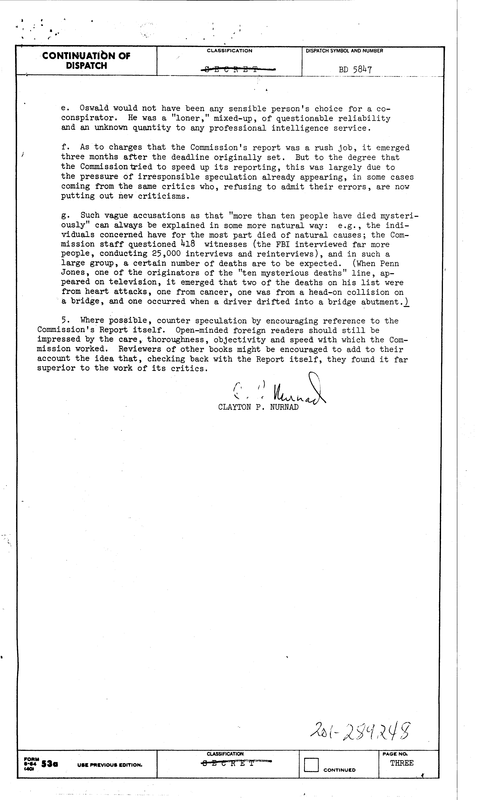|
This memo from April 1, 1967, provides keys for the media to attack those who would discuss the problems with the Warren Commission Report on the Kennedy assassination. It is well worth reading in full.
0 Comments
A columnist named Dave Hon published an article called “Why I’ll Never Date a Feminist.” It’s kicked up quite a stir. Why he would want to do this to himself, since there are much easier ways to go viral, is beyond anyone’s reckoning, but the fallout has been predictable. The fact that he also included a pleased-as-punch pic of himself only added to the fire; his dartboard smirk seems to beg, “Swipe right, ladies.” The actual content of the article is so dumb that I don’t really want to go tête-à-tête with him. There’s no point. (He seems to think the wage gap between men and women is not an objective fact for some reason. He writes: “No doubt, men enjoy privileges that women don’t but that boat goes both ways.” That’s an actual quote.) However, this might be a good opportunity to address something that seems to come up over and over again.  I know, right? I know, right? So let’s be clear. Feminists aren’t asking for additional rights. Seriously. They’re not asking for men to make 79% of what women make. They’re not asking for reversal, any more than Martin Luther King was asking for white slaves. Feminists would like equal treatment under the law. They would also prefer not to be abused and raped as a matter of culture. This is not a terribly radical concept. Saying you’re against feminism is like saying you’re against everyone being fully human. It’s a non sequitur. Dave, if you feel threatened, it’s because some of your rights are being taken away – your right to have domain over others. That’s because many human beings have realized that this is an illegitimate right. All civil rights movements are fundamentally the same in at least one regard: the demand for self-determination and freedom from domain. There can be no sensible defense for wanting to retain power over other human beings in any regard. Period. How this is even an argument – how there can be pro and con positions for this – is incomprehensible to me. Maybe I'm biased since I married a feminist. And if you – like Dave – find yourself getting annoyed at the protests, or feeling like women should just accept their lowered value in society and get on with life, I want you to do a little thought experiment. Imagine that tomorrow Barack Obama, in a national address, announced that he was outlawing all football in our country. No pro teams, no college teams, all of it done in an instant, forever. Would you sit still for that? Would you write angry columns denouncing the President’s overreach? Would you march on Washington to reinstate football? Would you feel that a terrible violation had occurred, that an injustice had been done, that a void had been ripped into your life? If you would, then try to consider how someone else might feel who wants something that actually matters. The right to use a public bathroom, or the right not to sit only at the back of the bus, or the right not to get shot by the police, or the right not to be marginalized or valued for only one attribute and no others. Can you try to imagine yourself in that situation? That weird feeling is called empathy. We are all feminists, Dave, because we are all human. You just haven’t realized it yet.  Halfway through reading the new article by Reeves Wiedeman in this month’s New York Magazine (“The Sandy Hook Hoax,” September 5-18, 2016), I had a sudden realization: This is how they’re going to do it. That is to say, this is how they’re going to make it OK to expand the ban on certain forms of speech. The kind of speech that power doesn’t like. Wiedeman’s article profiles one Lenny Pozner, who lost one of his three children in the massacre at Sandy Hook. Pozner became upset when he found that many people on the Internet believed the massacre to be a fake. They had endless questions about the details of that day. They believed his children never existed, and that he was an actor. Indeed, Pozner asserts in the article, “Conspiracy theorists erase the human aspect of history.” The main hook in the story is that Pozner is said to have been a conspiracy theorist himself before the massacre. Previously, he claims he enjoyed the radio broadcasts of Alex Jones. Also invoked in the article is Professor James Fetzer, who has recently written a book called Nobody Died at Sandy Hook. In the words of the article: Pozner had entertained everything from specific cover-ups (the moon landing was faked) to geopolitical intrigue (the ‘real’ reasons why the price of gold sometimes shifted so dramatically) and saw value in skepticism. But for him, the appeal of conspiracy theories was the same was watching a good science-fiction movie. ’I have an imaginative mind,’ he said. As is wont to happen on the Internet when you start interacting with people, he received some terrible comments. Anyone who has read the Yahoo comments under any random article knows the sort of remarks that are made, powered by immaturity and anonymity. Many of these statements took a personal tone since they referred to his three dead children. Outraged, Pozner took it upon himself to fight back. He did so by creating something called Conspiracy Theorists Anonymous, which grew a small following. Some of these people, according to the article, were “…recovering conspiracy theorists just like him.” Continuing this theme of mental health, Wiedeman reports that Tiffany Moser was a former Sandy Hook conspiracy theorist who saw the light and began helping Pozner instead. Unfortunately, according to the writer, Moser “…did not give up fringe theories entirely and believes that her son has autism because of a childhood vaccine.” It turns out that Pozner has some training in information technology, although no details are provided in the article. In any event, he used this training to specialize in cleaning up the Internet of videos featuring Sandy Hook conspiracy theories. Pozner found that his most effective tool for getting material taken down was to file copyright claims whenever anyone used a family photo of him, or Noah, in a post. By his estimate, Pozner had successfully taken down hundreds of images…’A whole lot of them fear me,’ Pozner said proudly, nothing that much of the hoaxer community assumes he has connections at Google or works for the NSA. He created a movement, in the HONR Network, dedicated to take down content posted by ‘conspiracy theorists’ or ‘hoaxers.’ He and his followers persuaded Amazon to take down Fetzer’s book and filed a lawsuit against another Sandy Hook theorist, Wolfgang Halbig, for invasion of privacy. ** Let’s take the Sandy Hook part first. I don’t know what happened that day. There has been much written about the incident, and some of it seems interesting and some of it seems inane. However, it is, like anything else, an historical question that will be determined by facts and evidence. I know from much experience that the government does lie to its own people at times and is certainly not averse to setting up attacks against its own citizens. There is documented proof in the MK-ULTRA papers and in Northwoods, not to say the strong circumstantial cases that have been made in the assassinations of the Sixties, including JFK. Is Sandy Hook an example of this scenario? I don’t know. However, I am interested in something else. Whether you believe the 9/11 attacks emerged from Osama bin Laden in his cave, or was a domestic enterprise, we can all agree that the government immediately was in a position to take advantage of the attacks. This can perhaps be best summarized in Donald Rumsfeld’s famous “sweep it all up. Things related and not” memo. That is, 9/11 became both crutch and explanation for everything the government and its attendant military-industry-complex wished. It has gotten to the point now where the government more or less reinstated COINTELPRO on a much larger scale. I am therefore concerned, whatever the ultimate origin of the Sandy Hook incident, because it could be used as the justification for legislation or executive action. The right wing constantly talks about having their guns taken away, which is illogical and absurd in the face of enormous gun ownership. That isn’t to say though, that it couldn’t be used for something a little more subtle. The article, it seems to me, makes the following key observations:
Let me be clear. The Fetzer situation is regrettable. He resume reveals a brilliant man. His books Assassination Science and Murder in Dealey Plaza have some useful information and fine articles by people like Dr. David Mantik and Vince Palamara. Fetzer has unfortunately compromised JFK researchers by his belligerent behavior and outbursts, as well as supporting the most outlandish 9/11 theorists and then supporting a Holocaust denial book. I don’t know how or why this happened but it has damaged political researchers with the general public. Alex Jones likewise has made his fame by becoming essentially the Bill O’Reilly of conspiracy research, using his public outlets to bleat a random assortment of the true and untrue in a manner better suited to a wrestling match than serious discourse. The presence of both Fetzer and Jones on the scene has made it very easy for journalists to cite them as representing typical ‘conspiracy thinking.’ They are certainly far more visible than the Doug Valentines and Edwin Blacks of the world. And this is the false dichotomy that will aid those who wish to repress speech: A government investigating terrible crimes versus a group of lunatic conspiracy theorists seeking to disrupt the lives of the victims. All historical questions – no matter how impertinent – need to be resolved with facts and reason, not impeded by law. An article like Wiedeman’s appears to signal a new strategy in discouraging political research with brute force. Political research has always been consigned to a ghetto, albeit a ghetto which has produced some of the finest nonfiction writing in the country’s history. This article suggests that suing people and attacking retailers are appropriate ways to deal with information you don’t like. On this we must say no. Not every book we get is going to be as good and useful as ones by Talbot, or DiEugenio, or Fonzi, or Douglass, to mention just a few names. But we cannot have those books if we deny people to the right to think, and write, in the public sphere. It is the cost of doing business in a free republic. Is writing that the government faked a massacre of its own citizens in bad taste? Of course it is. Unless it happens to be true, in which case it is in terrible taste not to notice.
|
AuthorThis is Joe Green's blog. Archives
August 2021
Categories |
||||||







 RSS Feed
RSS Feed
